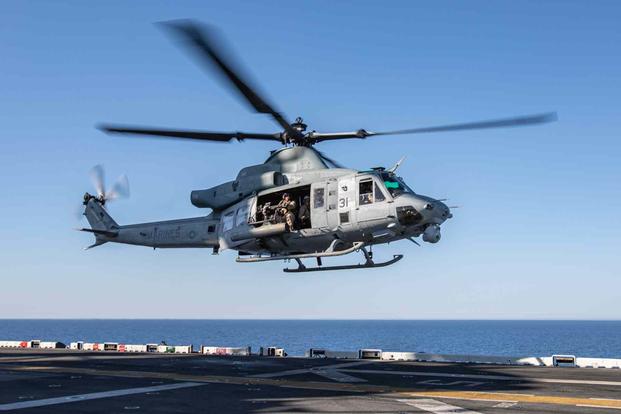Ever since reports surfaced that the Pentagon was considering putting Marines on commercial vessels to thwart Iranian influence in the Persian Gulf, questions and speculation have swirled around the topic.
One thing that hasn't materialized is a clear sign from the Pentagon that the plan is moving closer to reality.
"Marines are not boarding commercial ships, and I don't have anything additional to provide at this time," Sabrina Singh, a spokesperson for the Defense Department, told Military.com on Thursday when asked about reports of troops embarking on civilian ships in a "zone defense" against Iran.
While the questions over the plan and its details continue to go unanswered, some within the defense apparatus have been willing to come out and say that the capability to pull off such a mission not only exists, but Marines and sailors are ready to execute it.
The U.S. Naval Institute, or USNI, reported Aug. 11 that the 26th Marine Expeditionary Unit -- stationed aboard ships in the Middle East right now -- has received training in Bahrain that enables some members to work as "ship security teams."
What the Pentagon is signaling publicly and what is leaking to the press makes it unclear when -- or even if -- the capability would be used. It appears that the Marine Corps and Navy have the capability and recently trained specialized units to execute it, if ordered.
Pentagon leaders, for their part, do not appear ready to give that order or message it publicly -- a directive that would require more coordination than having the right troops in the right region.
One of the last times the U.S. military played a large, direct role in protecting tankers was during the late 1980s, when it helped escort Kuwaiti ships through the Straits of Hormuz.
That mission -- Operation Earnest Will -- required not only a government request for aid but also a scheme of re-flagging the ships to temporarily fly the U.S. flag. Despite all this, the operation didn't involve troops actually boarding any merchant ships.
As of today, it does not appear that any such requests or arrangements have been made.
However, what the military is not denying is that troops with the 26th MEU and Bataan Amphibious Ready Group have been training and are deployed to the Gulf of Oman to "help ensure maritime security and stability in the Middle East region," according to public press releases from the military.
"We've continued to see Iran or IRGC [Islamic Revolutionary Guard Corps] disrupting the free flow of commerce within the region, which is why the defense secretary made the decision that he did to deploy capabilities and more forces into the region to disrupt the IRGC from continuing its activity within the Strait of Hormuz," Singh told reporters earlier this month.
Then, Singh declined to directly comment on whether troops would be boarding civilian vessels, saying, "I'm not getting ahead of any decision that has been made or not been made by this department."
Marines and sailors arrived in the area in response to increased harassment and seizure of commercial ships by the Iranian Navy. Iranian harassment has been escalating in the region for more than four years, including a suspected 2019 attack on two oil tankers that spurred additional tensions between Washington and Tehran.
A series of attacks or attempted seizures continued. The latest known confrontation came in early July when the Navy said that U.S. forces prevented two seizures of commercial tankers by the Iranian Navy "after the Iranians had opened fire in one of the incidents near the coast of Oman."
On Monday, the Navy told Military.com that it would not go into specifics when asked about the training that 100 Marines and sailors reportedly went through in preparation for providing security on commercial ships. It did appear to acknowledge the larger contingent sent to the region and its purpose.
"The added forces provide significant operational flexibility and capability as we work alongside international partners to deter destabilizing activity and deescalate regional tensions caused by Iran's harassment and seizures of merchant vessels earlier this year," Cmdr. Rick Chernitzer, a spokesperson for the U.S. Naval Forces Central Command and 5th Fleet, told Military.com via email.
U.S. Central Command said that it had "seen the reporting" but similarly declined to confirm publicly whether troops would be placed on civilian ships. U.S. Marine Central Forces Command declined to comment.
The 26th MEU focuses on deterrence and access to open waters as its strategic concerns, according to the unit's website. The unit includes combat aviation, ground combat and logistics elements.
Its deployment to Middle East waters follows a recent re-designation as "special operation capable," or SOC, in July after an "enhanced, nine-month pre-deployment training program." It was the first time in more than a decade that a MEU was assigned the special designation to its moniker, according to the Corps.
That same month, the 26th MEU and Bataan Amphibious Ready Group prepared for their deployment to the Middle East by "cross-decking," a task meant to distribute equipment and personnel across different ships -- in this case, three ships.
By the beginning of August, more than 3,000 Marines and sailors entered the Red Sea.
-- Drew F. Lawrence can be reached at drew.lawrence@military.com. Follow him on Twitter @df_lawrence.
-- Konstantin Toropin can be reached at konstantin.toropin@military.com. Follow him on Twitter @ktoropin.
Related: Iran's Revolutionary Guard Runs Drill on Disputed Islands as US Military Presence in Region Grows















